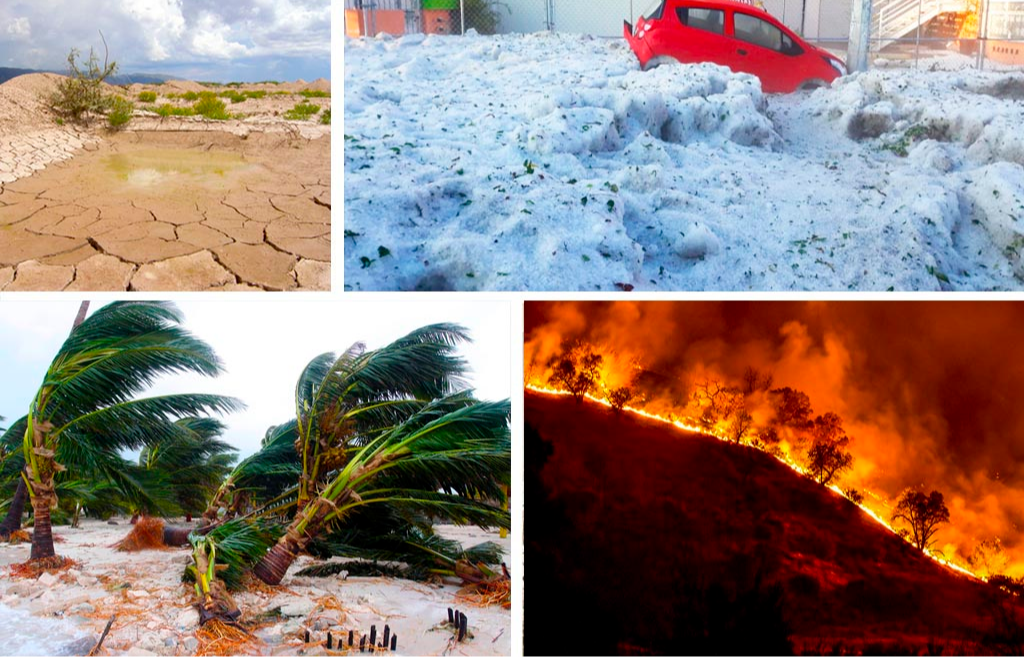
The environment in the year 2024
By Pedro Manuel Otero
2024 was not a good year for the environment. Extreme phenomena followed one another almost uninterruptedly, in an escalation that frightens and alerts the scientific community.
The year has set a negative record regarding temperatures. The European Union's Earth Observation Programme (Copernicus) and other scientific centers confirmed that 2024 has been the hottest year on record and the first in which the global temperature has exceeded 1.5 ºC compared to pre-industrial times.
The UN Climate Change Conference (COP 29) held in November 2024, in Baku, capital of Azerbaijan, put expectations of a viable temperature agreement on hold, and at its closing session only approved a modest amount of 300,000 dollars to finance climate change damages in developing countries, the most vulnerable ones.
Environmentalists forecasted a billion dollars in financial needs for this purpose.
At the same time, experts confirmed that temperatures will be hotter in the oceans in 2024 as well.
The average sea surface temperature anomaly was higher than the 1991-2020 average, making it the highest increase ever recorded.
In the same line of climate catastrophes, 2024 turned on red lights in the area of the magnetic poles. Arctic sea ice reached its fourth lowest extent. In Antarctica, ice extent was the second lowest on record.
Another scientific consideration was discouraging. The Atlantic meridional overturning circulation is near a turning point, which would severely alter climate.
Experts warn that crucial ocean currents, which transport heat, cold, and rainfall between the tropics and the far reaches of the Atlantic region, may collapse completely at some point if greenhouse gas emissions continue at the current rate.
Another important conference hosted by the UN in 2024 was COP16, the Conference of the Parties to the Convention on Biological Diversity, which brought together 15,000 delegates in Cali, Colombia, including 12 heads of state, 103 environment ministers and more than 1,000 journalists from around the world.
The meeting discussed the promotion of peaceful and inclusive societies and urged to double terrestrial and marine protected areas to reach the target of 30% preserved by 2030.
Cuba is one of the 26 countries that fulfilled the commitment to submit its National Strategy or Program to address biodiversity loss.
Another event with dire consequences was the climatic tragedy in late October and early November in the Spanish region of Valencia caused by the meteorological phenomenon known as the Cold Drop, an isolated depression at high atmospheric levels, formed by cold air, which caused heavy rains and floods, leaving some 200 dead and extensive material damage.
The meteorological event ranked as one of the worst disasters that has taken place in Spain in the last 100 years.
These 12 months were especially marked by an increase in forest fires in the Amazon and vast territories of Europe, the United States and Asia.
The environmental damage was severe. The destruction of biomass resulted in the loss of biodiversity and compromised ecosystem services such as air purification and regulation of the water cycle.
The UN Secretary-General Antonio Guterres stated that Climate catastrophe undermines people's health, exacerbates inequalities, undermines sustainable development and shakes the foundations of peace.
As for Cuba, the year was another weather nightmare, with difficulties and setbacks. The island is still recovering from the damage caused by 4 hurricanes, some with direct impacts on national territory and others with minor implications as they passed through nearby.
The impact of the weather phenomena claimed the lives of 8 people and caused a huge damage to property.
In addition to this scenario, there were two strong earthquakes with almost 1,990 aftershocks in the eastern zone, already heavily hit by the cyclones in question.
In the province of Granma, 10 people were injured by the earthquake, while 3,518 houses were affected. 109 educational centers and 59 in the health sector were damaged.
One expert said that the unprecedented rains and floods, rapidly intensifying tropical cyclones, deadly heat waves, relentless drought and devastating forest fires that we have seen this year in different parts of the world are, unfortunately, our new reality and a foretaste of the future.

